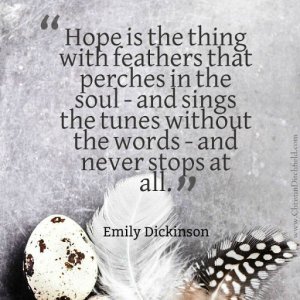That would be like me saying, "As a woman I don't have much in common with Shakespeare but I know men revere him"

I respect your opinion. Some men are romantic and some aren't.
But you probably don't know there's more to Emily Dickinson than romanticism. Romanticism is all throughout her poetry and lifestyle but she was also the barer of the threshold between the Romantic Era and Transcendentalist offshoot.
"Romantic characteristics and Transcendentalist ideals go hand and hand in her poem titled "I Could Not Stop for Death". Death, nature, and imagined past all compound with intuition and reliance on her inner being. By means of displaying Transcendentalist characteristics through Dickinson’s life, it can be safely concluded that Emily Dickinson was in fact the only person in America who really made Transcendentalism practical.”
Instead of looking outwards, she turned her sight inward. She reflected not only on moments of greatest pleasure, but also times of unrelenting pain and ambiguity toward her own spiritual identity and her constant struggle with the thought of death.
Instead of participating in a community based on religion that helps the surrounding community, she built her own “community" inside of herself by use of intuition and exercising her religious spirit.
"Dickinson’s solitary living promoted self betterment by means of her intuition and soul and her possible diagnosis of anorexia nervosa gives evidence to the lifestyle that one’s soul is vastly more important than “that which outwardly she showed.” From all of these traits one can conclude that Dickinson was in fact part of the Transcendentalist offshoot."




